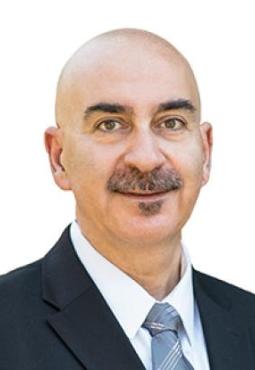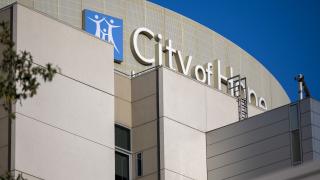A top-rated oncologist specializing in gastrointestinal cancer, George Hajjar, M.D., forges close bonds with his patients while overseeing several City of Hope facilities as regional medical director for the San Fernando Valley and Ventura County
George Hajjar, M.D., is living his dream and feeling quite fortunate. You can hear the smile when he describes his meetings with patients.
“There’s a lot of hugging,” he says.

A top-rated oncologist specializing in gastrointestinal cancer, Hajjar juggles two demanding roles: treating patients at City of Hope’s Santa Clarita location and overseeing several facilities as regional medical director for the San Fernando Valley and Ventura County.
As a physician, he continually receives high ratings on patient review sites. “A paragon of professionalism,” gushes one. “I trust Dr. Hajjar with my life,” says a second. “You should give him a raise!” urges a third. As an administrator, he earns praise from colleagues, who call him “adored,” “respected” and “a partner.”
Born in Syria, Hajjar is the first doctor in his family. He’s fiercely proud of Aleppo, his hometown (“It’s an amazing city,” he says), offering a capsule history lesson (“the oldest continuously inhabited city”) and travelogue (“the Citadel is one of the world’s oldest castles”) at the drop of a hat.
As early as he can remember, medicine and America beckoned.
“It was my dream since childhood to become a doctor,” he recalled. “Over there [in Syria], we really appreciate doctors,” he explained. “We call them hakim, which means ‘the wise one.’”
First Doctor in His Family
Coming from a working-class background with no doctors in his family to serve as role models, Hajjar committed himself to education, earning superior grades in high school and making his career choice clear to all. “Everybody knew George was going to be a doctor,” he recalled.
His desire to make a difference was reinforced as he watched two aunts deal with cancer. Later, during his medical school days at Aleppo University, Hajjar’s mother was diagnosed with breast cancer. Hajjar suddenly became the family expert. “Everyone started calling me, looking for advice,” he remembered. “I started thinking about oncology.”
Hajjar knew he would move to the U.S. to complete his training. The American lifestyle attracted him. So did the presence of dozens of relatives on the East Coast. Mostly, though, he remembered what he’d always heard back home. “In Syria, when we look for a good doctor, we always want one who’s American-trained,” he said.
Hajjar dismisses whatever culture shock, language barriers and sideways glances he encountered as a young Syrian doctor walking the corridors of Seton Hall-St. Joseph’s Hospital in Paterson, New Jersey.
“We learned English in Syria,” he explained. “Of course, it was ‘academic’ English, so I had a little difficulty [in the U.S.] in the beginning — nothing major. The shock was seeing so many other ethnic groups. But I adapted well. And people were so nice.”
Speaking Compassion
A physician at City of Hope since 2016, he is the go-to doctor anytime an Arabic-speaking person needs care, cancer-related or not. It is also not unusual for Hajjar to pick up the phone, call Syria and offer advice to a cancer patient there at the request of a cousin or uncle here in the U.S. “I do that very often,” he said. “People like to speak to someone who speaks their language.”
Universally, Hajjar speaks the language of compassion and connection quite well. He spends ample time with his patients, answering their questions, addressing their concerns and getting to know them. Because cancer, he says, is different.
“We’re dealing with a life-changing disease,” he said. “Not just for the patients, but for families too. It’s so important that patients feel they’re being listened to.”
The attitude is appreciated.
“He was very positive, and he made me feel good. We just connected right away,” recalled 84-year-old Laurance Richardson, a retired pharmaceutical agent who came to City of Hope in October 2021 for treatment of gastric cancer that had spread to his liver. Hajjar started him on targeted therapies, followed by immunotherapy drugs.
“I told him I was going to beat this thing,” said Richardson. “He was glad to hear it, and we fist-bumped.” Richardson is doing so well now that he’s returned to the gym and his regular workouts.
When Cherie Louis, an interior designer, needed help dealing with her chronic myelogenous leukemia, she found a kindred spirit in Hajjar. At their initial meetings, she found him to be “very quiet.” But then Louis came in one day, distraught over the death of a close relative in a car accident, not realizing that Hajjar had lost a brother the same way. The walls came down. Now they probably spend as much time discussing family as they do medical matters.
“He really does get it,” said Louis, who’s been seeing Hajjar monthly for four years. “He’s invested in me, and I’m invested in him. He’s my partner.”
The same word comes up when colleagues describe Hajjar’s work as an administrator, a role he assumed relatively recently.
“He partners with you,” said Leticia Kubel, senior regional director of operations. “He supports his staff and goes to bat for his patients. And he’s humble. He never puts himself above anyone else.”
Hajjar also has a “hidden” talent. An accomplished musician, “I was very close to becoming a professional violinist,” he said. He set aside that ambition to focus on medicine.
He applied that virtuosity to the lab, winning a pair of awards for research early in his career. His focus was radioimmunotherapy: using a radioactive isotope to deliver a monoclonal antibody directly to the tumor site. He sees major advances coming in these areas, compared to traditional chemotherapy, which he calls “shooting in the dark.”
Today, Hajjar is most excited about the rapid progress of next-generation genetic sequencing, creating, in effect, “an ID card for every tumor.” He credits City of Hope affiliate TGen for enabling much of this work.
Off the job, Hajjar delights in family life — he and his wife have three daughters; the youngest, age 12, has already decided to become a neurosurgeon. On the job, he knows he’s landed in the right place. He’d been referring patients to City of Hope for years.
“I believe the name City of Hope just says it all,” he explained.
Reflecting on his time at City of Hope, Hajjar praises the excellence in academic research paired with compassionate physicians and medical staff.
“It’s the best decision I’ve made.”
